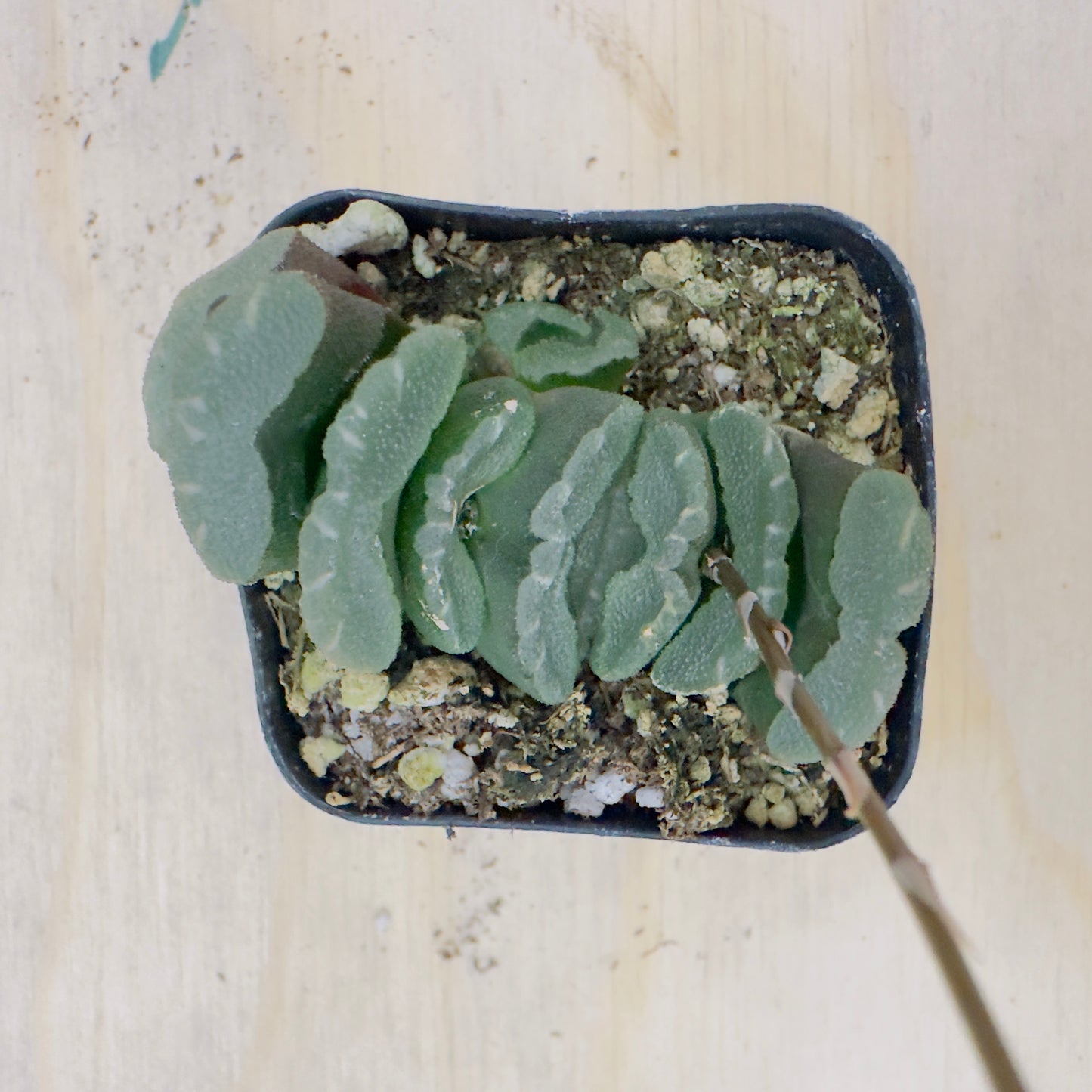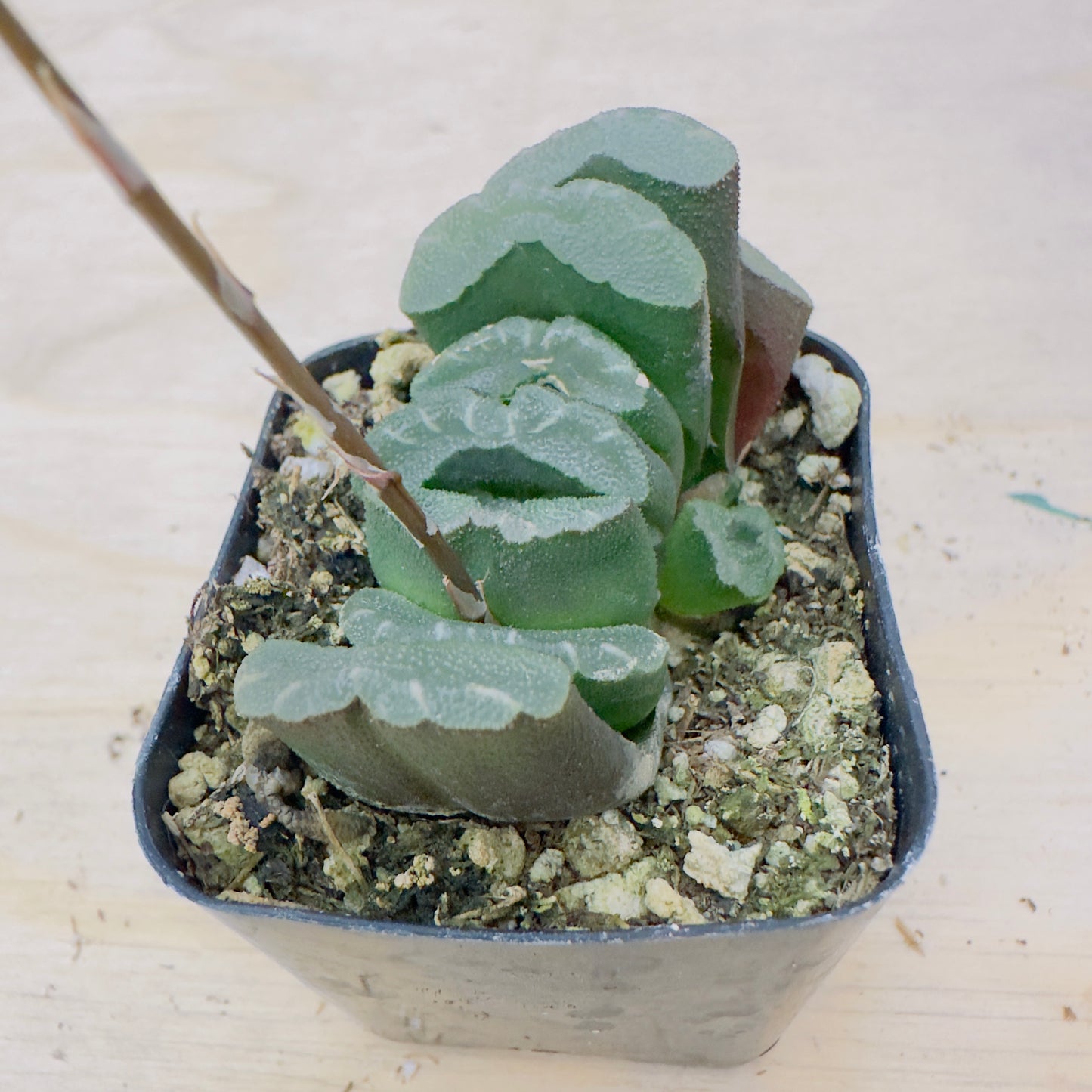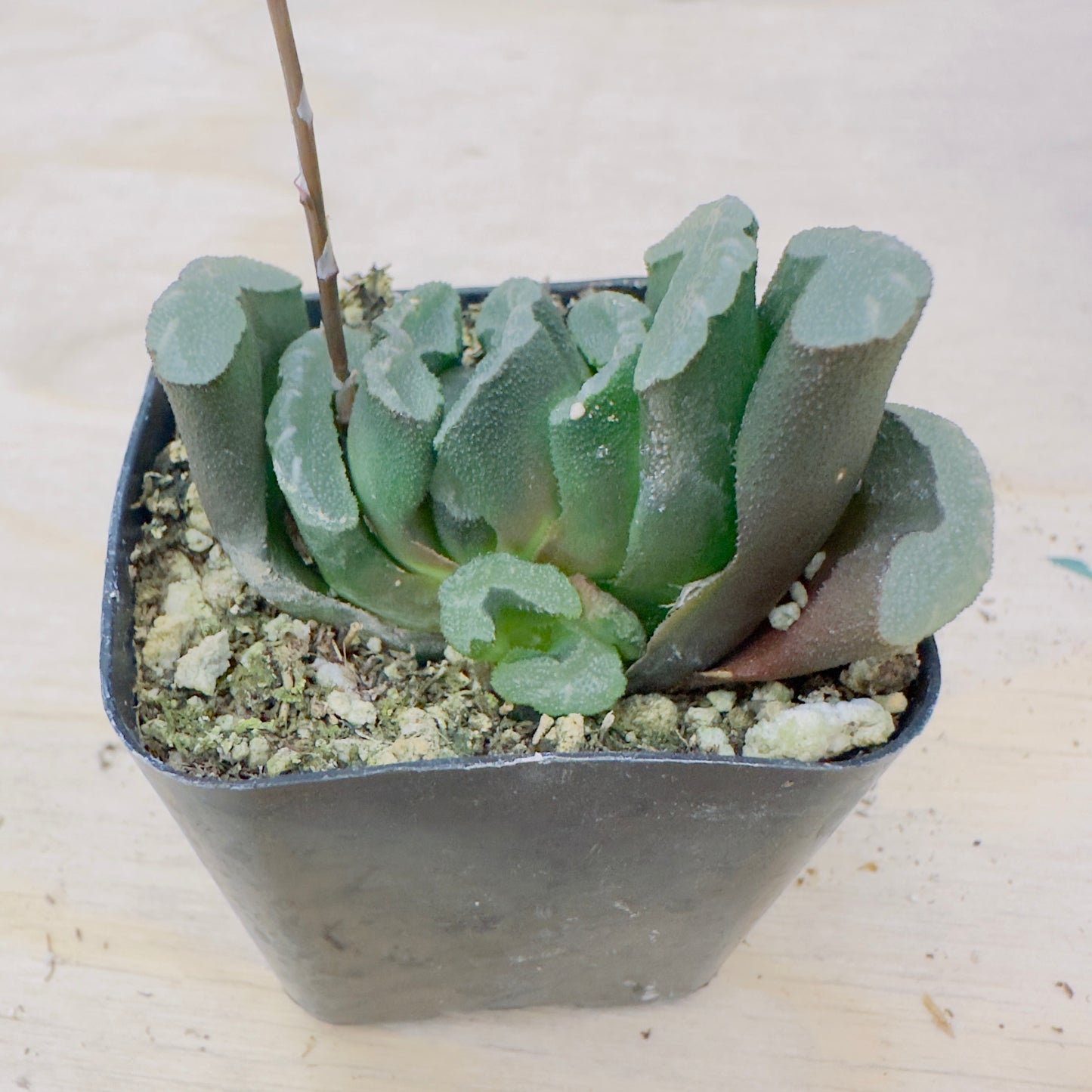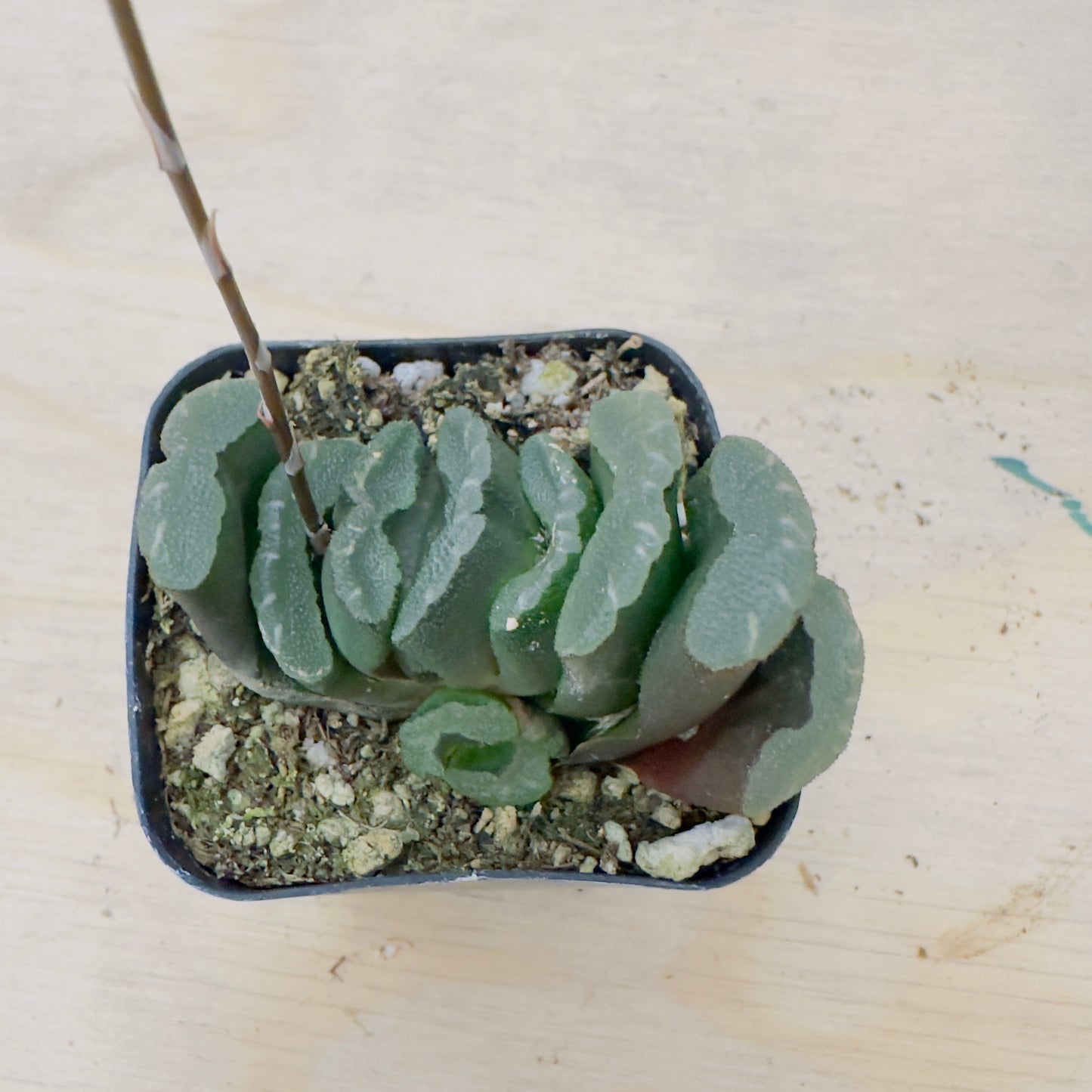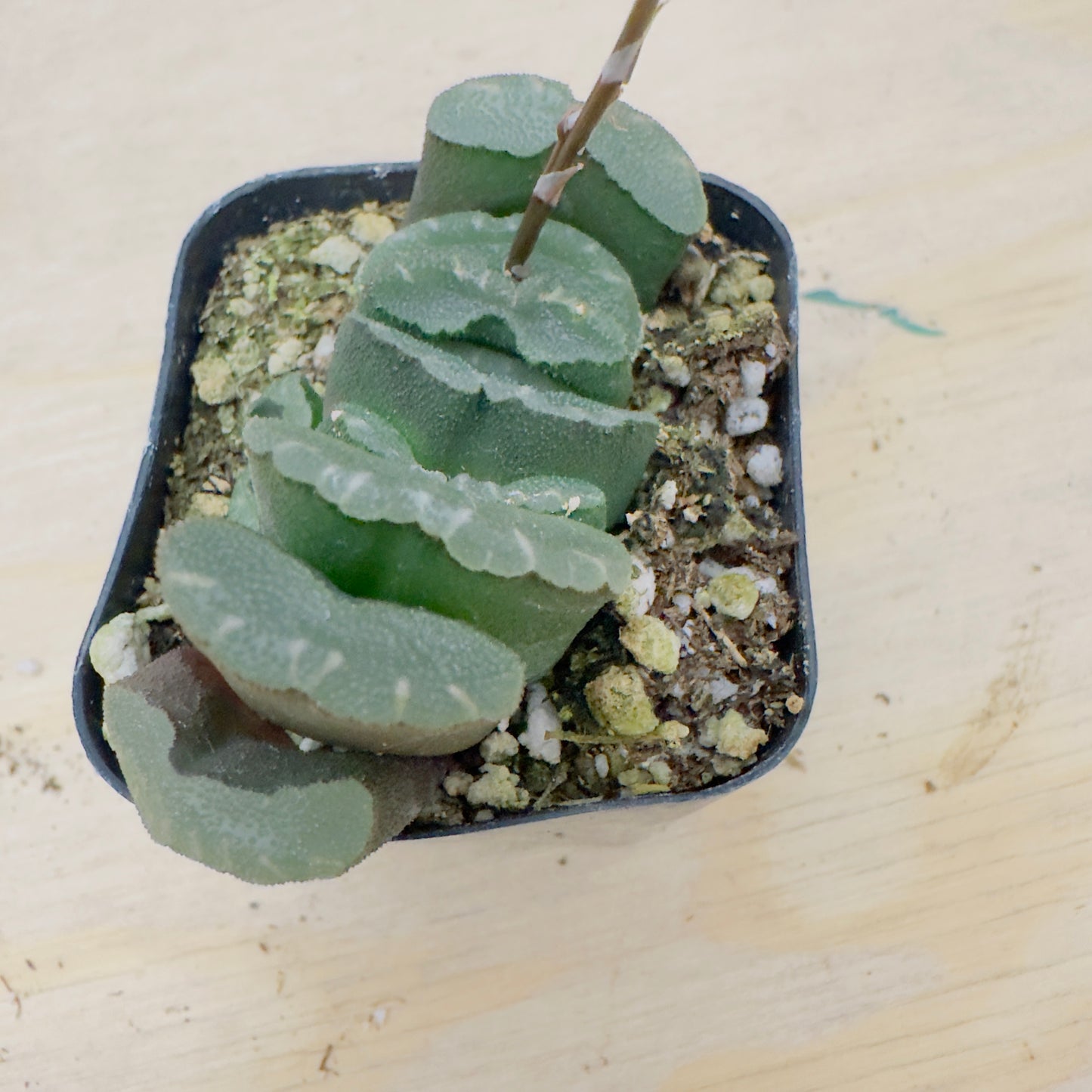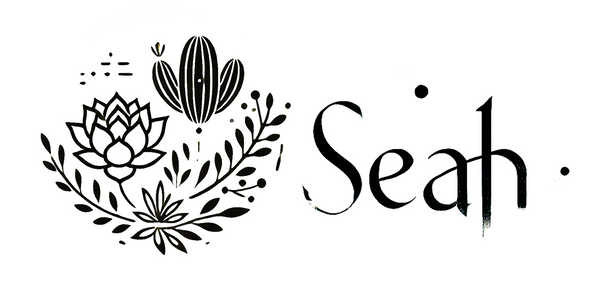haworthia truncata - Horse’s Teeth
haworthia truncata - Horse’s Teeth
In stock
Couldn't load pickup availability
📝 Description
Morphological Characteristics
Haworthia truncata is a distinctive and highly collectible succulent known for its unusual leaf structure and striking symmetry. Unlike most succulents that form rosettes, H. truncata grows in a fan-like, linear arrangement with fleshy, truncated leaves that emerge vertically from the soil.
Each leaf has a square or rectangular end with a flat, translucent “leaf window” that allows light to penetrate deep into the plant for photosynthesis. The surface texture is often mottled with green, gray, or brown patterns, creating a camouflage-like appearance.
Mature specimens grow slowly, forming tight rows of thick, chunky leaves that resemble horse teeth—hence the common name. It typically remains under 8 cm (3 inches) tall but can spread wider with age.
Growth Habits
This species is extremely slow-growing and prefers a stable environment with minimal disturbance. It typically grows as a single, non-offsetting clump but can produce pups at the base over many years.
Because of its compact size and architectural growth form, it is ideal for windowsills, bonsai-like arrangements, or display in shallow ceramic containers.
Maintenance Points
• Lighting: Prefers bright, indirect light or filtered morning sun. Avoid harsh midday sunlight, which can scorch the leaf windows.
• Watering: Water only when the soil is completely dry. Overwatering is the main cause of rot. Reduce water in winter dormancy.
• Soil: Requires a very well-draining mix—use cactus soil with added pumice or coarse sand.
• Temperature: Thrives at 18–27°C (65–80°F). Protect from frost; not tolerant below 5°C (41°F).
• Fertilization: Fertilize lightly during the growing season (spring/summer) with diluted succulent fertilizer.
• Handling: Avoid touching the leaf windows, as oils from fingers can damage their clarity and beauty.
• Pests: Rarely affected but watch for mealybugs and root rot in overly humid or wet conditions.
Display & Use
Haworthia truncata is a living sculpture, often showcased in:
• Minimalist, shallow planters with dark stone topdressing
• Japanese-style plant arrangements or dish gardens
• Succulent bonsai containers or indoor desk displays
• Collectors’ showcases due to its rarity and visual impact
🌿 Care Tips
Plant Care
Light
Water
Soil
Temperature
Hardiness
Fertilizer
Propagation: Leaf/offset cuttings
Common issues: Etiolation, mealybugs, rot
🌟 Note: It’s normal for succulents to appear slightly shriveled after shipping. They usually recover within a few days in a suitable environment.
📦 Shipping Info
Seah Shipping Policy
Effective Date: November 2025
This Shipping Policy applies to orders delivered within the continental United States (the lower 48 states). By purchasing from Seah, you agree to the terms below.
1) Shipping Cost & Free Shipping
- Automatic rate calculation: Shipping is calculated at checkout based on weight, destination ZIP and carrier rates.
- Free Standard Shipping: Orders $59+ (pre-tax, after discounts) ship free to the lower 48 states.
- Alaska, Hawaii, Puerto Rico & other territories: Not eligible for free shipping or standard flat offers at this time.
- Taxes/Duties: Applicable sales tax and any fees are shown at checkout.
2) Processing Schedule
- Business days only: We process and ship Monday–Friday. No shipping on weekends or U.S. federal holidays.
- Handling time: 1–3 business days after payment confirmation.
- Cut-off time: Orders placed before 3:00 PM (PST) are prioritized for same-day processing; others roll to the next business day.
- Changes/Cancellations: Email support@seah.co within 12 hours of purchase; after that, the order may already be in processing.
3) Transit Times
| Method | Estimated Transit | Total ETA (Handling + Transit) |
|---|---|---|
| Standard | 5–8 business days | 6–11 business days |
| Express | 3–4 business days | 4–7 business days |
ETAs are estimates. Weather, holidays, carrier delays or high-volume periods may extend delivery times.
4) Seasonal Temperature & Plant Safety
- Winter (Nov–Mar): We strongly recommend adding a heat pack at checkout to protect plants from freezing. Orders shipped without a heat pack during cold conditions are not covered for cold damage.
- Summer heat: During extreme heat waves, we may hold shipments until temperatures normalize. We’ll notify you if there’s a hold.
- Packaging: Plants are carefully packed (bare-root or potted by type/size) to minimize transit stress.
5) Carriers & Tracking
- We ship via USPS / UPS / FedEx, selected automatically for best service to your address.
- When your order ships, you’ll receive a tracking email. Tracking typically activates within 24 hours.
- If you haven’t received tracking within 3 business days, contact us at support@seah.co or +1 (626)-999-1314.
6) Address Changes & Delivery Issues
- Before shipment: Request address changes within 12 hours of ordering.
- After shipment: We can’t modify the address once dispatched. Please contact the carrier for redirection options.
- PO Boxes: Supported for USPS only; UPS/FedEx require a street address.
- Seah isn’t responsible for delays or loss due to incorrect addresses provided at checkout.
7) Service Area
We currently ship to the continental U.S. (lower 48 states). Orders to AK/HI/PR and other territories are not eligible for free shipping and may be restricted.
8) Support
- Hours: Mon–Fri, 9:00 AM – 5:00 PM (PST)
- Phone: +1 (626)-999-1314
- Email: support@seah.co
- Address: 7870 Margaux Pl, Rancho Cucamonga, CA 91739, United States
Thank you for supporting our California nursery—each plant is hand-selected and packed with care. 🌱
